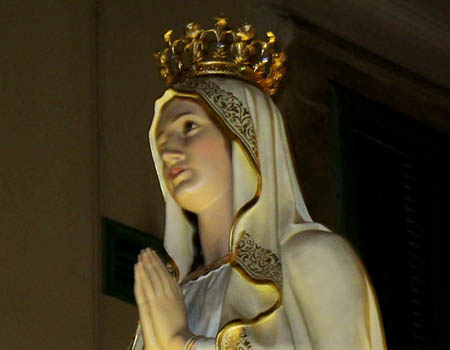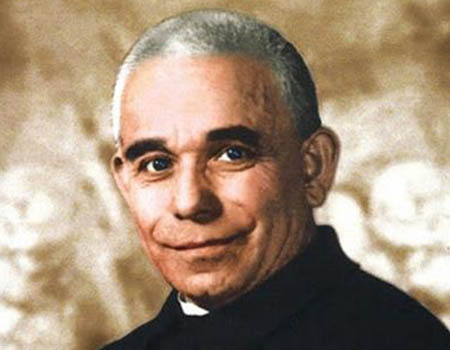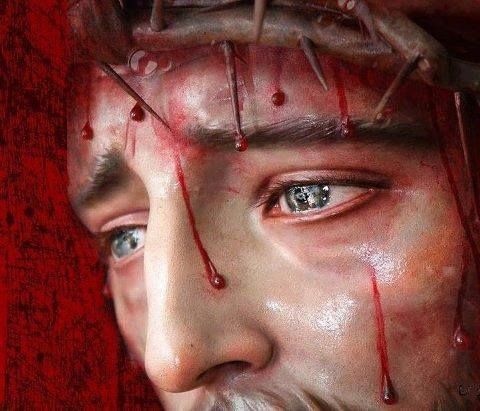
06/11/2014
Catechesi N. 45
A - "Misericordia voglio e non sacrificio" (citazione di Osea 6,16). Se leggiamo queste parole con gli insegnamenti del Cristianesimo, capiremmo che senza amore e misericordia, anche molti atti devozionali risulteranno inutili..
B - Nell'insegnamento dottrinale la zizzania è un pericolo per la sana dottrina, per la Fede di tutti i credenti.
C – Il ricorso alla preghiera ottiene prima o poi le Grazie desiderate, specie se nella perseveranza del chiedere, uniamo l’impegno e la realizzazione di una vita spirituale profonda.
D - Noi siamo ciò che scegliamo di essere, pensiamo e parliamo secondo la spiritualità che abbiamo dentro. È indiscutibile questo.
Incredibile testimonianza di un sacerdote morto e resuscitato cliccare sotto per vedere il filmato, poi altre testimonianze di guarigione.
http://www.youtube.com/watch?v=oAD-AGCVqSY
http://www.youtube.com/watch?v=1WAvMoV_iSw
http://www.youtube.com/watch?v=AcW8dNw4DCc
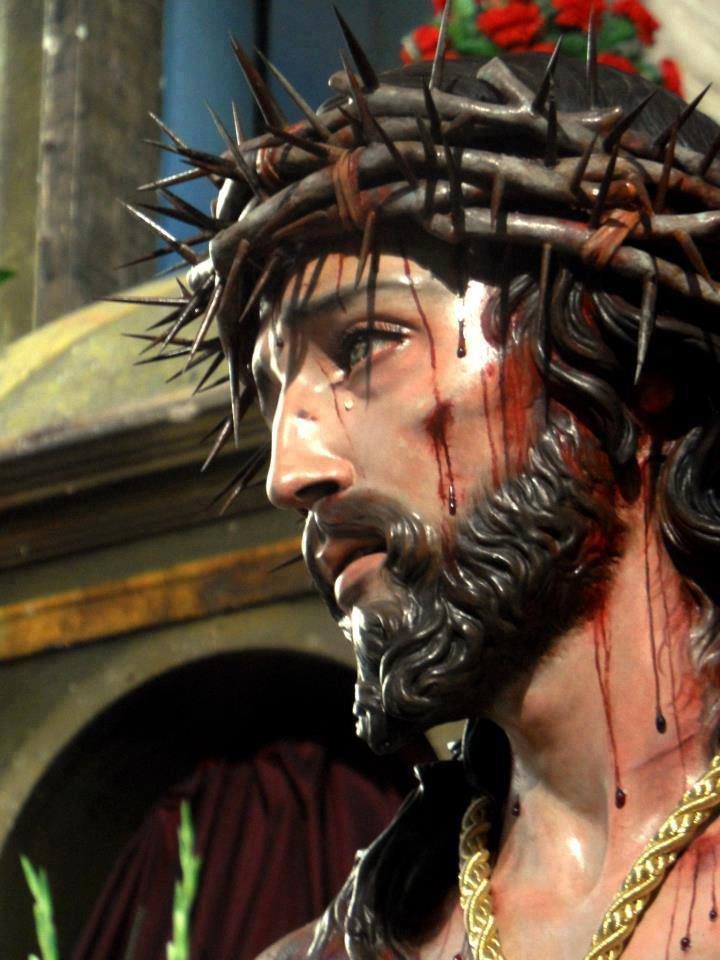
A - "Misericordia voglio e non sacrificio" (citazione di Osea 6,16). Se leggiamo queste parole con gli insegnamenti del Cristianesimo, capiremmo che senza amore e misericordia, anche molti atti devozionali risulteranno inutili.
I farisei sono gli ipocriti che vivono per condannare gli altri, tacendo sui crimini da loro commessi. In questo passo del Vangelo, vediamo la stretta vigilanza posta dai farisei per cogliere in difetto i discepoli di Gesù.
I farisei, intrisi ormai della loro cattiveria e del loro odio, erano al limite della sopportazione e in procinto all’esplosione.
Rimproverarono Gesù perché i suoi discepoli mangiavano qualche chicco di grano, spigolando nel giorno di sabato.
Secondo la Legge del tempo, il sabato era lecito spigolare ma non mietere. Per questo motivo i farisei molto maliziosi, equiparano lo spigolare dei discepoli al mietere, azione quest’ultima ritenuta invece illecita il giorno del sabato.
Gesù in risposta ai farisei, ricordò loro cosa fece Davide e li azzittì, poiché dinanzi alla fame, si può non obbedire alla legge. Così come anche i sacerdoti ebrei, lavoravano al sabato nel Tempio, per offrire i sacrifici del loro lavoro al Signore.
I farisei ,che a quel punto si trovarono in difficoltà dinnanzi agli esempi portati dal Signore, cercarono di contraddirlo affermando che : il lavoro dei sacerdoti svolto al sabato era sacro poiché inerente al culto divino. Allora Gesù rispose che la sua volontà era più grande e importante di qualsiasi altra legge e volontà, più grande anche del Tempio.
Questa affermazione suonò come una bestemmia per i farisei.
Chi poteva essere più grande del Tempio? Solo Colui che vi abitava, solo Dio.
Ma loro non compresero che proprio Gesù che gli parlava in quel momento, era Dio. Gesù aggiunse : "Misericordia voglio e non sacrificio" (citazione di Osea 6,16) volendo far loro capire che non si può non perdonare a degli uomini che hanno fame, se colgono qualche spiga di grano anche il sabato.
La misericordia di cui Gesù parlò era più grande del sacrificio di animali nel Tempio, dove in questo caso chi moriva era l'animale. Ma per usare la vera misericordia l'uomo deve “lasciar morire se stesso” ed agire con spirito di umiltà e di amore.
Se leggiamo queste parole con gli insegnamenti del Cristianesimo, capiremmo che senza amore e misericordia, anche molti atti devozionali risulteranno inutili.
Quando Gesù si dichiarò “Signore del sabato”, voleva dirci che lui era Dio, il Quale aveva istituito il sabato.
Nella visione del Profeta Daniele, Gesù comparve davanti all'Altissimo con le sembianze di un uomo, definendosi Figlio dell'Uomo, a cui fu dato appunto, "potere, gloria e regno… e il suo potere è un potere eterno" (Dn 7,14).
Di quel potere eterno fa’ parte la signoria sul sabato, data all'uomo non perché l'uomo se ne rendesse schiavo , ma per onorare Dio
Lo stesso vale per i beni materiali, i sentimenti, il lavoro, la fedeltà, l'amicizia, la verità, la giustizia. Buona preghiera a tutti.
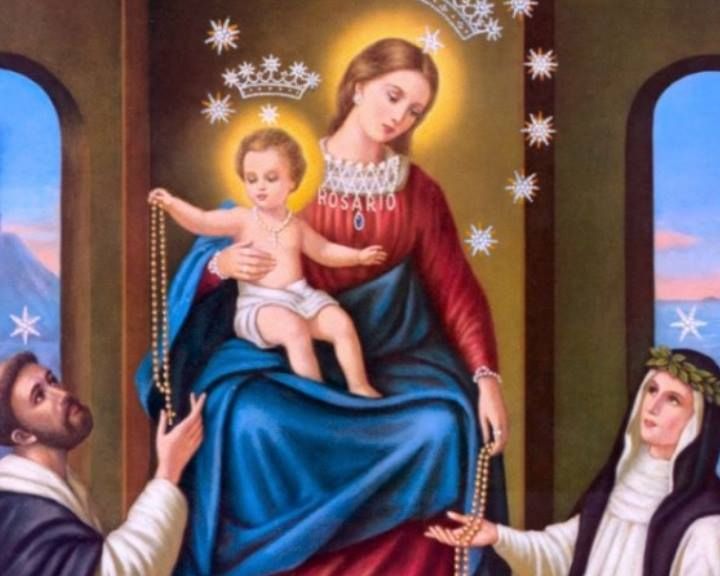
B - Nell'insegnamento dottrinale la zizzania è un pericolo per la sana dottrina, per la Fede di tutti i credenti.
Questa domenica presentiamo tre brevi parabole: quella della zizzania, quella del granello di senape, quella del lievito.
La caratteristica di Gesù nel predicare rispetto ai predicatori di quel tempo era la semplicità delle sue parole, colme di chiarezza, linearità e purezza.
Non è sufficiente saper parlare o parlare molto. Bisogna vedere se il discorso regge e non contiene incoerenze.
Solo Dio poteva parlare facendosi comprendere anche dai più incolti e non cadere mai in contraddizione.
In molti altri insegnamenti, Gesù ricorre alle Scritture per evidenziare che le sue sono parole bibliche, e non episodi inventati. In queste tre parabole, prendendo ad esempio episodi noti, Egli spiega con brevità e chiarezza cosa intende per Regno dei Cieli.
Nella prima parabola parla di “zizzania”. Questo termine viene identificato da tutti noi per indicare un comportamento estremamente dispregiativo. Infatti, quando si vuole descrivere una persona che semina falsità o vive disordinatamente, il suo comportamento viene identificato con il termine “zizzania”. Seminare “zizzania” equivale a diffondere falsità, diffamazioni, a creare divisione nella famiglia, tra amici, tra persone che si conoscono.
Gesù in questa parabola si riferisce volutamente a fatti di vita quotidiana , di vita campestre, applicandone il significato alla vita spirituale dei suoi seguaci. È una parabola attualissima. Il mondo nella sua completezza, è il campo dove il Signore semina costantemente e incessantemente il seme della sua Grazia.
Gesù venne tra noi lasciandoci la sua dottrina, per prepararci come terra buona. Contrariamente ai suoi intenti però, "mentre tutti dormivano, venne il suo nemico, seminò zizzania in mezzo al grano e se ne andò".
C'è sempre un nemico che semina eresie, errori, cattiverie, diffamazioni e per preservarci da tutto ciò dobbiamo invocare la protezione della Madonna.
La zizzania è una pianta graminacea che infesta i campi di cereali, cresce tra loro, prendendone le sembianze e diventando quasi indistinguibile agli occhi del contadino. Solo col tempo, l’esperto capisce la differenza, poiché la zizzania, a differenza del grano, presenta la spiga esile e un chicco minuto.
La zizzania è pericolosa, e se mescolata con la farina buona contamina il pane, divenendo nociva all’uomo.
Seminare zizzania tra il grano era un caso tipico di vendetta personale. Una vera calamità per i contadini, che potevano arrivare a perdere anche tutto il raccolto. Da qui l'inserimento di questa frase nella parabola: “Un nemico ha fatto questo!”.
Nell'insegnamento dottrinale la zizzania è un pericolo per la sana dottrina, per la Fede di tutti i credenti.
La zizzania si identifica con la cattiva dottrina, con l’eresia, che in un primo tempo potrebbe superficialmente esser confusa con la verità. Il tempo però ci insegna che l’errore produce sempre conseguenze catastrofiche nel popolo di Dio. Nella parabola la zizzania agisce “mentre tutti dormivano”; oggi i cristiani si sono addormentati e hanno lasciato al nemico la libertà di seminare la cattiva semente nella più completa impunità.
Sono nati errori dottrinali intorno a quasi tutte le Verità della Fede e della morale. Chi è oggi vigilante per conservare la sua Fede? La zizzania della cattiva dottrina e delle eresie spesso arrivano dalle persone meno sospettabili.
La zizzania che demolisce la buona dottrina oggi e sempre più radicata in alcune pubblicazioni, in molti programmi televisivi, in quelle letture piene di errori, di insegnamenti opposti al Vangelo. La prudenza ci invita quindi ad utilizzare con cura e diligenza i mezzi attraverso i quali formarci per una sana dottrina. Non bisogna mai credere a quanto ci viene “insegnato” solo perché l'oratore è simpatico o è un amico. Dobbiamo vigilare attentamente su ciò che apprendiamo, analizzarne il contenuto e valutarne la veridicità, secondo gli insegnamenti del Catechismo.
Chi non veglia lascia piena libertà al nemico infernale, che infonde errori e conduce alla sterilità con l'allontanamento da Dio.
Gli errori di valutazione e la mancata conoscenza della sana dottrina, portano alla perdita della Fede, procurandoci danni e rovine. Molte persone conducono la propria esistenza cedendo alla tristezza, allo sconforto, alla confusione totale , alcune volte cedendo persino al peccato. Molti, a causa della loro vulnerabilità, si lasciano travolgere da mode e idee prepotentemente diffuse da personaggi influenti.
L’intelligenza è offuscata da falsi ragionamenti. Si crede a ciò che piace e non a Gesù, complici quasi sempre le passioni distorte.
All'interno della Chiesa sono state diffuse dottrine opposte al Vangelo, chi le segue, anche per sola incompetenza, si allontana da Gesù. Buona preghiera a tutti.
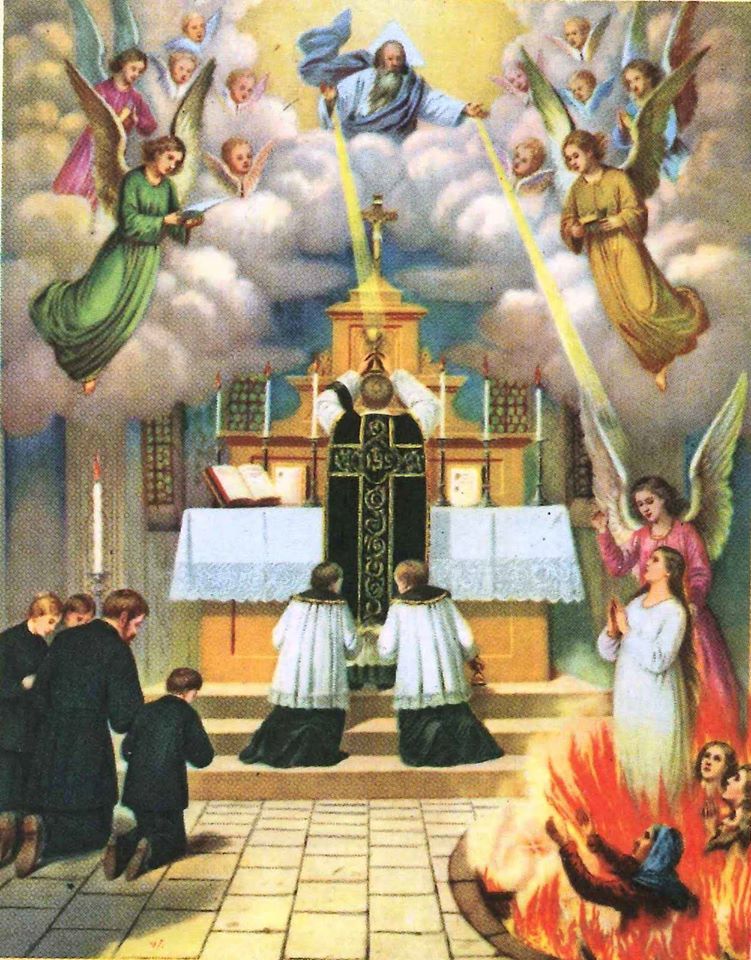
C – Il ricorso alla preghiera ottiene prima o poi le Grazie desiderate, specie se nella perseveranza del chiedere, uniamo l’impegno e la realizzazione di una vita spirituale profonda.
La storia di Maria Maddalena, è una festa liturgica significativa. Non è la storia di una Santa “normale”, ma la storia di una Santa unica.
Le vicende degli Apostoli sono tutte toccanti, tranne quella del traditore. La parabola della Maddalena però porta con se un significato impressionante ed è un esempio e uno sprone, per i peccatori più incalliti, a lottare per vincere i vizi e cercare la misericordia di Gesù.
La sua famiglia era ricca, ma lei presto scelse la vita dissoluta per seguire un istinto carico di bramosie immorali.
Le preghiere di Lazzaro e Marta, suoi fratelli, riuscirono a cambiare il cuore di Maddalena; fu una conversione lenta e lunga, come avviene a quelle persone sprofondate nei vizi più depravati. I due fratelli erano molto intimi con Gesù. La loro casa di Betania era un luogo di riposo e di ristoro. Quando incontravano Gesù chiedevano, con il cuore colmo di dolore, la salvezza della sorella attraverso una profonda e autentica conversione.
Il ricorso alla preghiera ottiene prima o poi le Grazie desiderate, specie se nella perseveranza del chiedere, uniamo l’impegno e la realizzazione di una vita spirituale profonda.
Si può ragionevolmente affermare che Santa Maria Maddalena, nacque miracolosamente nello spirito, dopo la nascita fisica e la morte spirituale. Maddalena, a causa delle sue scelte di vita scellerate e vivendo nella certezza dell’ immoralità, era indirizzata verso la dannazione, come avviene del resto a tutti i peccatori. Senza le preghiere dei suoi familiari e senza l'incontro con Gesù, non avrebbe mai potuto conoscere la Gloria eterna.
Nessun peccatore deve considerarsi dannato o impossibilitato alla conversione. Certo è che i peccatori incalliti non possono vivere continuando a commettere peccati sperando poi nell’assoluzione della Confessione. La misericordia di Dio è infinita, ma non possiamo certamente abusarne.
Dobbiamo distinguere due aspetti: il primo è che Gesù è infinitamente misericordioso, il secondo è che un peccatore non può perseverare nel peccato mortale, consolandosi nella speranza o nella certezza che Dio è infinitamente buono e perdonerà tutto. In questa errata convinzione, si strumentalizza la misericordia, assecondando fini viziosi ed egoistici.
È un discorso che spiegherò meglio.
Il significato della misericordia infinita non favorisce la ripetizione ostinata di peccati mortali perché tanto poi Dio perdona.
Il peccatore ostinato non deve essere sicuro di potere arrivare in tempo alla Confessione sacramentale o di pentirsi dei peccati commessi!
L'esempio di Maria Maddalena è diverso. Lei rifiutava la religione e quindi non cercava consolazione nel perdono. Mentre lei con i suoi gesti immorali scendeva sempre più verso l’inferno, le preghiere dei suoi fratelli riparavano di continuo i suoi peccati, ottenendo la Misericordia di Dio e la sua risalita. La tiravano per i capelli. Maddalena restò per diversi anni sospesa tra l'inferno e la salvezza.
Per questo insisto con voi e vi invito a pregare di più, non solo per la vostra salvezza, ma anche per quella dei vostri familiari lontani da Gesù e distratti dalla cattiveria e dalla bruttezza del mondo.
Con mia grande premura prego ogni giorno per tutti voi e vi benedico più volte al giorno perché è grande la mia certezza sulla potenza della Preghiera. Sono vicino a tutti voi che frequentate l’Associazione e desidero il meglio per voi e i vostri familiari. Lo ripeto ogni giorno nelle preghiere a Gesù e a Maria Santissima.
Non mi dimentico mai di ognuno di voi! Buona preghiera a tutti.
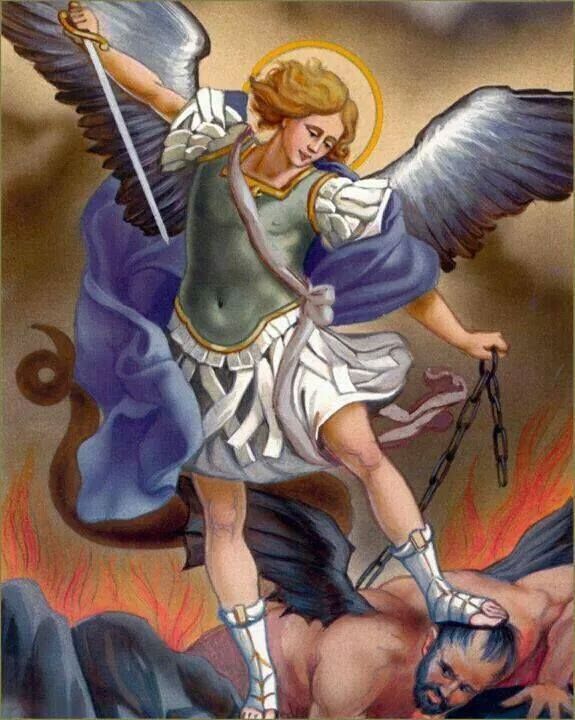
D - Noi siamo ciò che scegliamo di essere, pensiamo e parliamo secondo la spiritualità che abbiamo dentro. È indiscutibile questo.
Gesù ci insegna che la sola Preghiera non è mai sufficiente per diventare veri discepoli. Riconosciamo gloria a Dio, quando portiamo frutti spirituali nel cammino di Fede.
Ogni cristiano deve chiedersi a chi vuole dare gloria nella sua vita. Se vuole dare spazio alla presenza di Dio oppure vuole mettere se stesso al centro di tutto.
Sono scelte sottili e molto spesso la maggior parte dei credenti non arriva a comprendere questa distinzione o forse nemmeno se ne preoccupa. Tale distinzione la si può comprendere attraverso le parole di coloro i quali vivono questa spiritualità, ce la spiegano e ce ne trasferiscono il valore, con autorevolezza, serenità e gioia.
Spesso quando si prega o si compiono opere di apostolato si può dare gloria a se stessi, continuando ad operare nel Nome di Gesù…
Si può pregare per vanità, si può fare apostolato per vanità, si possono fare penitenza per vanità, si possono fare incontri per vanità.
In che modo possiamo comprendere la retta intenzione delle nostre scelte?
Il Precursore Giovanni Battista non appena scorse l’arrivo di Gesù disse: "Lui deve crescere e io invece diminuire" (Gv 3,30).
Gesù deve crescere in noi. La sua sola presenza nella nostra vita allontana le miserie e le false illusioni dello spirito umano, ma l'azione del Signore su di noi diverrà ancora più potente, se gli apriamo totalmente la porta del nostro cuore.
Il modo più efficace per aprirgli il nostro cuore è quello di fare opere di rinnegamento e di rinuncia verso tutte quelle cose che possiamo eliminare o, almeno, utilizzare con molta più moderazione. Non saper rinunciare alle cose che ci piacciono, pur potendone fare a meno, è come morire spiritualmente.
È una vera scelta vitale: o seguiamo lo Spirito Santo che trasfigura la persona e le fa iniziare una vita santa oppure abdichiamo per inseguire le vuote frivolezze.
Noi siamo ciò che scegliamo di essere, pensiamo e parliamo secondo la spiritualità che abbiamo dentro. È indiscutibile questo.
Gesù oggi dice : “il Padre taglia il tralcio che non porta frutto, "in me", e con queste parole si rivolge ai cristiani improduttivi e non ai pagani. I pagani non sono considerati tralci, sono tali poiché hanno scelto di vivere lontano dalla vera Vite.
Molti di essi non sono nemmeno battezzati, altri lo sono ma non vivono le promesse fatte per amore e intercessione dei loro genitori nel sacramento del Battesimo. Ci sono altresì uomini battezzati, che in età adulta bestemmiano, rinnegando il Battesimo ricevuto e chiedono nelle parrocchie la facoltà di cancellarlo. Il Battesimo invece è un sigillo indelebile ed eterno.
Gesù precisa inoltre, che ci sono tralci bisognosi di aiuti particolari, che portano frutti ma l'impegno non è sufficiente, così il Padre li pota, eliminando quelle scorie e miserie che danneggiano l'anima. Questa potatura spesso è dolorosa, è una purificazione permessa dal Padre per santificare quell'anima “danneggiata” e renderla splendente.
Dal disegno che il Padre ha scelto per quell'anima, si capisce il grado di purificazione: più è profonda e dolorosa, più vuole elevarla in santità. Questo lo ha sperimentato anche San Giovanni della Croce e poi lo ha scritto. Era Padre spirituale di Santa Teresa d'Avila. Fu tenuto carcerato per nove mesi dai suoi stessi confratelli carmelitani perché rifiutavano la riforma scritta dal Santo e non intendevano cambiare vita.
La purificazione di San Giovanni della Croce durò molti anni ma alla fine, riuscì nell'intento della riforma, perché questo era il volere di Dio.
Santa Brigida di Svezia visse in una famiglia aristocratica, si dedicò alle opere di carità, e con il marito condusse una vita spirituale molto intensa. Gesù le rivelò le Orazioni, diede molti consigli, e la fece messaggera di importanti lettere inviate ai potenti di quel tempo.
Tra le rivelazioni di Gesù alcune riguardano i nostri tempi:
"Prima che venga l’Anticristo, le porte della Fede verranno aperte a un gran numero di pagani".
"Un segno chiaro dell'arrivo dell’Anticristo ci sarà quando i cristiani ameranno gli errori e quando le persone ingiuste calpesteranno la spiritualità e la giustizia". Buona preghiera a tutti.
Santa Caterina da Bologna
English Edition
Catechesis N. 45
A - "I want Mercy and not sacrifice" (quote from Hosea 6.16 ). If we read these words with the teachings of Christianity, must insist that without love and mercy, even many devotional acts will be useless.
B - In doctrinal teaching the tares is a danger to the sound doctrine, for the faith of all believers.
C - The use of prayer obtains, sooner or later, the Graces you want, especially if the perseverance of the ask, let us join the commitment and the realization of a deep spiritual life.
D - We are what we choose to be, think and speak according to the spirituality that we have inside. It is an indisputable this.
18 /07/2014
A - The Pharisees are the hypocrites who live to condemn others, keeping silent about their crimes . In this step of the Gospel, we see the close supervision placed by the Pharisees to seize in defect the disciples of Jesus.
The Pharisees , soaked now of their wickedness and of their hatred, were at the limit of their endurance and in the process of the explosion.
Rebuked Jesus because his disciples were eating a few grains of corn, gleaning on the Sabbath day.
According to the Law of time , the Sabbath was lawful glean but do not harvest. For this reason the Pharisees very mischievous, equate the gleaning of the disciples to reap, action it deemed unlawful on the Sabbath instead.
Jesus in response to the Pharisees, reminded them what David did and silenced them, since before the hungry, you may not obey the law. As well as the Jewish priests , worked on Saturday in the Temple, to offer the sacrifices of their work to the Lord .
The Pharisees, who by then were in trouble before the examples given by the Lord, tried to contradict him saying that : the work of the priests played on Saturday was sacred because inherent in the divine worship. Then Jesus said that his will was bigger and more important than any other law and will, even greater than the Temple.
This affirmation sounded as a blasphemy to the Pharisees.
Who could be greater than the Temple? Only the One who lived there, only God.
But they did not understand that Jesus himself who spoke to them at the time, was God. Jesus added : "Mercy I want and not sacrifice" (quote from Hosea 6.16 ) wishing to make them understand that we cannot forgive to men who hunger, if seize a few ear of wheat also on Saturday.
The mercy of which Jesus spoke it was larger than the animal sacrifice in the Temple, where in this case who died was the animal. But to use the true mercy man must "let himself die" and act in a spirit of humility and love.
If we read these words with the teachings of Christianity, we would understand that without love and mercy, many acts of devotion will be useless.
When Jesus declared himself "Lord of the Sabbath", he wanted to tell us that He was God, the One had set up the Saturday.
In the vision of the Prophet Daniel, Jesus appeared before the Most High with the likeness of a man, defining itself Son of Man, to which was given precisely, "power, glory and kingdom… and his power is an everlasting dominion" (Dn 7,14 ).
The lordship of the Saturday is part of that eternal power, given to man so that man should not become slave of it, but to honor God.
The same applies to material goods, the feelings, the job, the loyalty, friendship, truth, justice. Good prayer at all.
santa Caterina da Bologna
20 /07/2014
B - This Sunday we are presenting three short parables: the one of the tares, that of the mustard seed, the parable of the leaven.
The characteristic of Jesus in preaching compared to the preachers of that time was the simplicity of his words, full of clarity, linearity and purity.
It is not enough to know how to speak or talk much. We need to see if the speech holds and does not contain inconsistencies.
Only God could speak making himself understand even by the most uneducated and never falling into contradiction.
In many other teachings, Jesus uses the Bible to show that his words are biblical and not invented events. In these three parables, using the example of well-known episodes, he explains with clarity and brevity what he means by the Kingdom of Heaven.
In the first parable He speaks of "weeds". This term is identified by all of us to indicate an extremely derogatory behavior. In fact, when we want to describe a person who sows deceit, or lives disorderly, his behavior is identified with the term "weeds". Sow "weeds" is tantamount to spreading falsehood, slander, to create division in the family, between friends, between people who know each other.
Jesus in this parable purposefully refers to facts of everyday life, of country life, applying the meaning to the spiritual life of his followers. It is a very current parable. The world in its entirety, is the field where the Lord constantly and continually sowing the seed of his Grace.
Jesus came among us leaving to us his doctrine, to prepare us as a good ground. Contrary to its intents, however, "while everyone was sleeping, his enemy came and sowed weeds among the wheat and went away."
There is always an enemy that sows heresies, errors, malice, slander, and in order to preserve ourselves from all that, we have to invoke the protection of Mary.
The tares is a plant species that infest the fields of grain, grows between them, making the semblances and becoming almost indistinguishable in the eyes of the peasant. Only with time, the expert understands the difference, because the weeds, unlike wheat, has hexyl ear and a minute grain.
The tares, is dangerous, and if mixed with the good flour contaminates the bread, becoming harmful to humans.
Sow tares among the wheat was a typical case of personal revenge. A real disaster for the peasants, that could arrive to lose even the whole harvest. From here the insertion of this sentence in the parable: 'An enemy has done this! ".
In doctrinal teaching the weeds is a danger to sound doctrine, by the faith of all believers.
The weeds are identified with the bad doctrine, with the heresy, which at first might superficially be confused with the truth. But time has shown that the error always produces catastrophic consequences in the people of God. In the parable, the tares act "while everyone was asleep"; Christians today have fallen asleep and left to the enemy the freedom to sow bad seed with impunity.
Doctrinal errors have been born around almost all the Truth of Faith and morals. Who is now vigilant to preserve his Faith? The weeds of bad doctrine and heresies often come from people not be suspected.
The tares that demolishes the good doctrine today is increasingly rooted in some publications , in many television programs, in those readings full of errors, of teachings opposed to the Gospel. Prudence invites us then to use with care and diligence the means by which be formed for a sound doctrine. We should never believe what we are "taught" only because the speaker is nice or is a friend. We must be very careful on what we learn , analyze the content and assess the veracity, according to the teachings of the Catechism.
Those who do not watch leaves full freedom to the infernal enemy, who infuses errors and leads to sterility by turning away from God.
The errors of evaluation and lack of knowledge of sound doctrine, lead to loss of Faith, providing us with damage and ruins. Many people lead their lives giving way to sadness, and discouragement, to the total confusion, sometimes falling even in sin. Many, due to their vulnerability, let themselves be swept away by fashions and ideas powerfully spread by influential people.
Intelligence is obscured by false reasoning. It is believed in what we like and not to Jesus, accomplices almost always distorted passions.
Inside the church were spread doctrines opposed to the Gospel, those who follow them, even for just incompetence, he turns away from Jesus. Good prayer at all.
Santa Maria Maddalena in estasi
22 /07/2014
C - The story of Mary Magdalene, is a liturgical feast significant. It is not the story of a "normal" Saint, but the story of a unique Saint.
The histories of the Apostles are all touching, apart that of the traitor. The parable of Mary Magdalene, however, carries with it an impressive meaning and is an example and incentive for the most hardened sinners, that struggle to overcome the defects and seek the mercy of Jesus.
Her family was rich, but very soon she chose the dissolute life to follow an heavy instinct of immoral greeds.
The prayers of Lazarus and Martha, her brothers, managed to change the heart of Maddalena; it was a slow and long conversion, as it happens to those people dug in the more depraved vices. The two brothers were very intimate with Jesus. Their house of Bethany was a place of rest and refreshment. When they met Jesus, with the heart filled of pain, they asked for the salvation of her sister through a deep and authentic conversion.
The recourse to prayer obtains sooner or later, the Graces you want, especially if with the perseverance of the ask, we combine the commitment and the realization of a deep spiritual life.
We can reasonably say that St. Mary Magdalene, was born miraculously in the spirit, after the physical birth and the spiritual death. Magdalene, due to her choices of iniquitous life and living in the certainty of immorality, was directed toward damnation, as happens to all sinners. Without the prayers of her family and without the encounter with Jesus, she would never been able to know the eternal Glory.
No sinner must be regarded as goddamn or unable to conversion. Of course, it is that hardcore sinners cannot live by continuing to commit sins hoping then in the acquittal of the Confession. The mercy of God is infinite, but we cannot certainly abuse it.
We must distinguish between two aspects: the first is that Jesus is infinitely merciful, and the second is that a sinner cannot persevere in mortal sin, finding comfort in the hope or in the certainty that God is infinitely good and forgive everything. In this mistaken belief , it exploits the mercy, favoring vicious and selfish purposes.
It is a discourse that I will explain better.
The meaning of infinite mercy does not favor the obstinate repetition of mortal sins because then God forgives.
The obstinate sinner must not be sure to arrive in time for sacramental Confession or to repent for the sins committed!
The example of Mary Magdalene is different. She refused the religion and therefore not sought consolation in forgiveness. While her with her immoral gestures descended more and more toward hell, the prayers of her brethren shipwrights of continued her sins, obtaining the Mercy of God and her lifts. They pulled her by the hair. Magdalene rest for several years suspended between hell and salvation.
For this I insist with you and invite you to pray more, not only for your salvation, but also for that of your family away from Jesus and distracted by the wickedness and the ugliness of the world.
With my great concern I pray every day for all of you and I bless you more times a day because it is great my certainty on the power of Prayer. I am close to all of you that frequent the Association and I wish the best for you and your family. I repeat every day in the prayers to Jesus and Mary.
I never forget each of you! Good prayer at all.
Santa Virginia
23 /07/2014
D - Jesus teaches us that the only prayer is never sufficient for it to become true disciples. We recognize glory to God, when we bring spiritual fruits in the journey of Faith.
Every Christian must ask who wants to give glory in his life. If he wants to give space to the presence of God or wants to put himself at the center of everything.
Choices are thin and very often the majority of believers do not understand this distinction or perhaps even care. This distinction can be understood through the words of those who live this spirituality, who explain and transfer to us the value, with authority, serenity and joy.
Often when we prays or make works of the apostolate we can give glory to ourselves, by continuing to work in the name of Jesus ...
We can pray for vanity, we can do apostolate for vanity, we can do penance for vanity, we can do meetings for vanity.
In what way can we understand the right intention of our choices?
The precursor Giovanni Battista as noticed the arrival of Jesus said : "He must increase, but I must decrease" (Jn 3.30 ).
Jesus must grow in us. Its only presence in our lives sends away the miseries and the false illusion of the human spirit, but the action of the Lord upon us will become even more powerful, if we totally open to Him the door of our heart .
The most effective way to open our heart is to do works of denial and renunciation toward all of those things that we can eliminate or, at least, use with much more restraint. Do not knowing how to renounce the things we like , while being able to do it, it is how to die spiritually.
It's a real vital option: either we follow the Holy Spirit who transforms the person and makes him starting a holy life, or we abdicate in order to chase the empty frivolities.
We are what we choose to be, think and speak according to the spirituality that we have inside. This is indisputable.
Jesus today says : "the Father cuts the branch that bears no fruit, "in me", and with these words he was addressing the unproductive Christians and not the Gentiles. Pagans are not considered branches, they are such because they have chosen to live away from the true Vine.
Many of them are not even baptized, others are but do not live promises done for love and intercession of their parents in the sacrament of Baptism. There are also men baptized, that in adulthood blaspheme, denying the Baptism received and ask in the parishes the faculty of deleting it. Baptism is instead an indelible and eternal seal.
Jesus also specifies that there are branches in need of special aid, that bring fruits but the commitment is not enough, so the Father cut them, eliminating those slags and miseries which damage the core. This pruning is often painful, is a purification permitted by the Father to sanctify that soul "damaged" and make it shiny.
From the drawing that the Father has chosen for that soul, we understand the degree of purification: the more it is deep and painful, the more He wants to raise her in holiness. This also experienced St. John of the Cross and then he has written it. He was spiritual Father of St. Teresa of Avila. He was held prisoner for nine months by his own Carmelite confreres because they refused the reform written by the Holy and did not intend to change their life.
The purification of Saint John of the Cross lasted many years but in the end, he succeeded in the reform, because this was the will of God.
Saint Bridget of Sweden lived in an aristocratic family, he devoted himself to works of charity, and with her husband led a spiritual life very intense. Jesus revealed to her the Orations, gave plenty of advice, and made her the messenger of important letters sent to the powerful of that time.
Among the revelations of Jesus some of them concern our times:
"Before the Antichrist, the doors of the Faith will be open to a large number of pagans".
"A clear sign that the Antichrist is about to arrive, there will be when Christians will love the errors and when people unjust tread down the spirituality and the justice." Good prayer at all.
Santa Virginia


